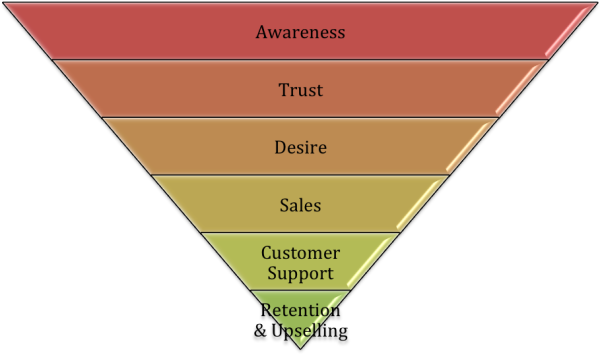Is SEO Being Ripped Asunder?
The responsibility for SEO is being assigned to various departments. Is this a good thing or a bad thing for the state of the industry?
SEO is very much alive. It’s just getting ripped-apart limb from limb, organ-by-organ, and transplanted as living tissue into various branches of marketing, development and IT departments.
While companies incorporate SEO into specialties (experts working in detached disciplines), the industry’s response has been for SEO professionals to generalize as Inbound Marketers.
Now that I’ve set this up, I hope you’ll read the rest and tell me what you agree/disagree with, as well as how you see SEO evolving as a profession and an industry. I hope to see some dynamic discussion.
There’s Difficulty In Justifying Dedicated SEO Positions
Search engine optimization impacts a broad range of operations:
- Web server optimization
- Website architecture
- Website design
- Internal linking
- On-page HTML
- User Experience
- Content creation
- Website marketing
- Audience targeting
- Community building
- Social media
While the bullets in lists like this vary, they share four goals:
- Optimize the site for known ranking signals
- Optimize content for desirable keywords and phrases
- Grow authority
- Drive non-paid search engine referral traffic
In businesses predicated on the idea that every job must create tangible results, justifying exclusive SEO positions becomes rather difficult.
At first glance, it might seem ideal to make the person ultimately responsible for the entire website answerable for search engine optimization. However, this does not work for a number of reasons.
First, SEO is a daily, in-the-trenches affair. Even after the server, CMS and templates are set, the need for fresh content coupled with promotion and authority building is constant. Yes, the CMO or web marketing director must champion SEO, but they cannot roll up their sleeves and dig deep into the minutia, especially at a large business.
Second, many companies consolidate disciplines into single departments. It’s normal for the IT department to manage the webserver and CMS, for application development to manage graphic design and for marketing to manage content. The one person supervising all of this is the Chief Operations Officer.
Should the COO evangelize SEO? Absolutely.
Manage it? No.
So who rules SEO?
SEO Ripped Apart
When SEO existed as a necessary though obscure and somewhat dark art in an immature online marketing ecosystem, it made more sense to establish dedicated SEO roles. Fortune level companies saw SEO professionals as internal consultants and teachers. At start-ups, department walls were porous and everyone pitched-in wherever needed, making a devoted SEO easier to fit in.
Keep in mind; CMS design, web analytics, conversion optimization, prospect tracking and many other disciplines were far less mature or distinct. In an odd way, SEO was more established than many of the tasks and tools we now take for granted. There was plenty for an SEO to do. And when not working on some aspect of the site itself or on content, old style link building never ended.
Over time, as search engine algorithms became more effective and SEO less mysterious, the rest of online marketing matured. Social media rose to the forefront. Marketing departments became more compartmentalized, adding specialists in conversion and testing, content creation, social media and community management and so on.
Today, more companies than ever care about and include SEO in their online marketing strategies. But rather than hire full-time search engine optimization experts, businesses want specialists in other roles to take on the parts of SEO they can incorporate into their duties.
The proof is on LinkedIn (account required). Search for SEO jobs, and you’ll see lots of titles that require SEO knowledge or experience; relatively few dedicated SEO positions. Over the last few years, the number of job descriptions including SEO has increased while the ratio of dedicated SEO jobs to jobs that include SEO has declined. (This is a personal qualitative observation. I’ve seen the same trend inside large companies I follow, including Amazon and Microsoft.)
Companies are harvesting SEO for its organs.
PPC As The New SEO Consultant
Not surprisingly, many businesses want a non-paid search traffic expert in-house without paying for a full-time SEO. A logical choice is the PPC department. After all, they work with keywords. It makes sense, right?
Personally, I am wary of this trend. Paid search strives for quick conversions and early ROI. When companies spend thousands to millions on paid search, they naturally want to capture people who will buy now or in the near future.
Non-paid clicks can capture the same people who are PPC targets. Simultaneously, organic search is well suited for the long game of building brand awareness and an audience. Lots of keywords PPC might dismiss are well suited for SEO.
I suppose a PPC specialist could email a set of keyword reports to the content team. I prefer a holistic approach to search engine optimization where everyone is on the same page and following a shared strategy, not checking off tick-marks.
Is There An Upside?
I became an SEO because influencing the search engine results fascinates me. It’s like trying to solve a Rubik’s Cube, except the rules keep changing.
Begrudgingly, I admit the separation trend makes some sense. As web commerce becomes responsible for more and more dollars, and as marketing gets more and more specialized, hiring people really good at one thing — people who know how to implement SEO in their expertise and who understand how they influence SEO — can make more sense than hiring someone whose role appears to be that of telling others how to do their jobs.
SEO can be a synergistic force among teams. When community management, content generation, graphic design, marketing automation and other skillsets work together on a shared vision, they can accomplish much more than a single person. The combination of marketing funnel optimization and search engine optimization is well suited to drive that vision.
Funnel optimization, like SEO, is broad in scope. It begins with brand building and awareness, and then dives into creating trust, desire, sales and customer support. Not only must there be content for each level of the funnel; each level must guide visitors and prospects deeper, to the next step of the marketing and sales process.
Search engine optimization provides proof of concept. It discovers what words and phrases people search for. It uncovers the websites that create content and links and identifies the influencers who generate word of mouth. Mature SEO is not about tricking or manipulating search engines. It’s earning their respect through market leadership. Great online marketing leads to great SEO results.
Market leadership requires the cooperation of an entire organization. So perhaps the time for the dedicated SEO, outside of an advisory and evangelist job, has largely passed.
Inbound Marketing, The SEO Response
As a response to SEO’s dismemberment, many in the industry have responded equally and oppositely. Rather than specializing in one area, something that includes aspects of SEO, we have become generalists: Inbound Marketers.
I am a part of this trend. I describe myself as an Inbound Marketer. I recognize how many disparate aspects of marketing and web development come together to result in optimized sites, content and authority growth. Yet, at the same time, I see the irony.
While businesses are separating the roles and responsibilities of SEO, many of us in the field are adding all the routes to free traffic we can wrap our heads around.
Wil Reynolds exemplified this at MozCon:
I do wonder if the term Inbound Marketing has peaked. While it seemed to gain some traction, I hear it spoken less often.
Whether you become a specialist (like a developer, content writer or community manager) or a generalist (an Inbound Marketer), the one thing industry thought leaders seem to agree on is this: don’t stand still!
Are Agencies Poised To Win?
As a final thought, I think reputable agencies, the likes which present at SMX conferences, are well equipped to benefit from the specialization trend. As outside counsel, agencies are suited to see the forest, trees and leaves.
Agencies can advise clients how well their SEO efforts integrate into their overall marketing efforts and whether or not their marketing supports SEO. They can advise, train and coach the people who make SEO part of their jobs. They can keep track of the search engines, industry news and trends, then impart usable knowledge to clients.
It’s little wonder large advertising, PR and marketing agencies have added SEO expertise in-house or acquired it by via buyouts of and partnerships with SEO agencies.
Image credits: stock image used with permission of Shutterstock.com
Cover of Inbound Marketing by Brian Halligan, Dharmesh Shah
Contributing authors are invited to create content for Search Engine Land and are chosen for their expertise and contribution to the search community. Our contributors work under the oversight of the editorial staff and contributions are checked for quality and relevance to our readers. The opinions they express are their own.
Related stories
New on Search Engine Land


